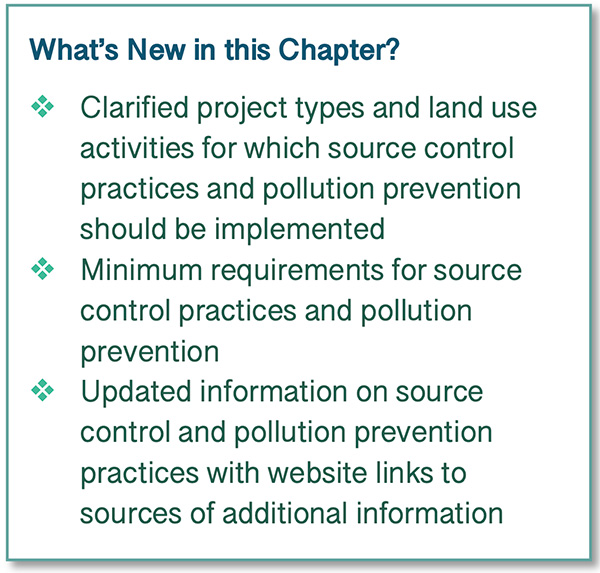Click on the headers for PDF access of these sections of the Manual
Introduction
Controlling the sources of pollution and preventing pollutant exposure to stormwater is an important aspect of an effective stormwater management strategy. Source control practices and pollution prevention are operational practices that limit the generation of stormwater pollutants at their source. Most are typically non-structural, require minimal or no land area, and can be implemented with moderate cost and effort as compared to structural measures.
Source control practices and pollution prevention should be incorporated, to the maximum extent practicable, into the site design and operational aspects of all land development projects, including but not limited to new development and redevelopment activities associated with:
- Commercial and industrial sites
- Institutional facilities
- Residential development
- Municipal facilities and operations
Over the past several decades, a large amount of information on stormwater source control and pollution prevention practices has been developed and refined as part of the CT DEEP stormwater general permit programs, including the MS4 General Permit (Good Housekeeping and Pollution Prevention for Municipal Operations), Industrial Stormwater General Permit, and Commercial Stormwater General Permit. Many other Connecticut-specific and regional information sources are available on these topics through organizations such as the CT Nonpoint Education for Municipal Officials (NEMO) Program, UConn Center for Land Use Education and Research (CLEAR), and watershed groups throughout the state.
This chapter has been revised and abbreviated to provide basic guidance on the use of source control practices and pollution prevention for common land development activities and land use settings in the State of Connecticut. Website links are provided to other available sources of more detailed information on each topic, rather than duplicating the information in this document, which may become outdated over time. CT DEEP may periodically update the website links and add or remove information sources.
Recommended Practices
Guidance on various practices for source control and pollution prevention in all settings (commercial, industrial, institutional, residential, and municipal). Tables with minimum requirements and sources of additional information for each practice type also provided.
